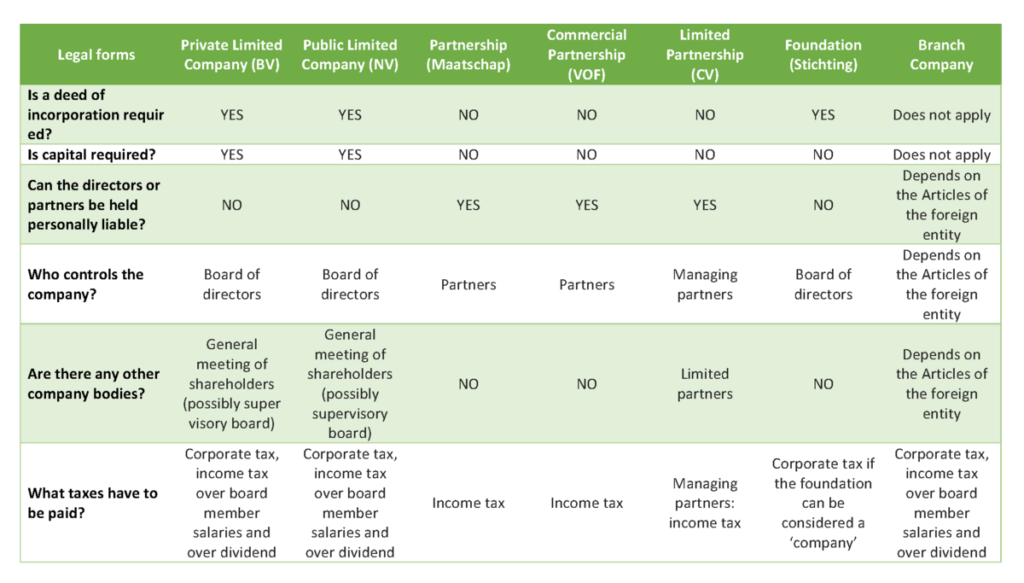
Introduction
Are you considering starting a company in the Netherlands? Understanding the legal requirements to form a Dutch company is the first step towards turning your business idea into a reality. In this article, we will explore the basic legal requirements you need to know when starting a business in the Netherlands.
From choosing the right legal structure to registering your company with the Dutch Chamber of Commerce, there are specific steps you must follow. Depending on the nature of your business, you may also need to obtain specific licenses or permits.
Forming a company in the Netherlands may seem complex, especially if you are unfamiliar with the Dutch legal system. However, by gaining a clear understanding of the essential legal requirements, you can navigate the process with confidence and ensure compliance.
Whether you are an aspiring entrepreneur or an experienced international business owner, this guide will provide you with valuable insights into launching your company in the Netherlands. So, let’s dive in and discover what it takes to establish a Dutch company.
Types Of Dutch companies
Before delving into the legal requirements, it is important to understand the different types of Dutch companies you can form. The most common types include:
Sole Proprietorship: Also known as eenmanszaak, this is the simplest form of business structure where you are the sole owner and responsible for all liabilities.
Partnership: A partnership involves two or more individuals who share the responsibilities and profits of the business. There are different types of partnerships, such as general partnerships (VOF) and limited partnerships (CV).
Private Limited Liability Company (BV): BV is a separate legal entity with limited liability. It requires a minimum share capital of €0.01 and offers more flexibility and credibility.
Public Limited Liability Company (NV): NV is similar to BV, but with stricter regulations. It is suitable for larger businesses planning to go public or raise capital through stock offerings.
Branch Office: If you already have a foreign company and want to establish a presence in the Netherlands, you can set up a branch office. It operates as an extension of the parent company.
Each type of company has its own advantages and considerations, so it is crucial to choose the one that aligns with your business goals and objectives. Now that we have a brief overview of the company types, let’s move on to the legal requirements for forming a Dutch company.
Legal Requirements For Forming A Dutch Company
Choosing a company name and legal structure: The first step is to choose a unique company name that complies with Dutch naming regulations. The name should not be misleading and should not infringe on existing trademarks. Once you have a name, you need to decide on the legal structure that best suits your business.
Registering Your Company With The Dutch Chamber Of Commerce: All Dutch companies must be registered with the Dutch Chamber of Commerce (Kamer van Koophandel or KvK). This registration provides your company with a unique identification number (KvK number) and is required for various legal and administrative purposes.
Obtaining A Dutch Tax Identification Number: To operate a business in the Netherlands, you need a tax identification number (TIN). This number is used for tax-related matters, such as filing taxes, invoicing, and hiring employees. You can obtain a TIN from the Dutch Tax and Customs Administration (Belastingdienst).
Opening A Bank Account For Your Dutch Company: Having a dedicated bank account for your Dutch company is essential for managing your finances and conducting business transactions. You will need to provide the necessary documentation, such as your company’s registration details and identification documents, to open a bank account.
Hiring Employees And Obtaining Work Permits: If you plan to hire employees in the Netherlands, you need to comply with Dutch labor laws and obtain any necessary work permits. The requirements vary depending on the employee’s nationality and the duration of their employment.
Meeting Ongoing Legal Obligations For Dutch Companies: Once your company is established, there are ongoing legal obligations you must fulfill. These include filing annual financial statements, complying with tax regulations, and adhering to employment laws. It is important to stay informed and seek professional advice to ensure compliance.
As mentioned earlier, depending on the nature of your business, you may also need to obtain specific licenses or permits. It is recommended to consult with a legal advisor or business consultant to determine any additional requirements for your specific industry.
Conclusion
Starting a company in the Netherlands requires a solid understanding of the legal requirements. By choosing the right legal structure, registering your company, obtaining the necessary tax identification number, opening a bank account, and fulfilling ongoing obligations, you can establish a Dutch company with confidence.
Remember, compliance with Dutch laws and regulations is crucial to the success and sustainability of your business. It is always recommended to seek professional advice and consult with experts who specialize in Dutch company formation.
For more detailed information and guidance, you can refer to the following resources:
[Dutch Chamber of Commerce (KvK)](https://www.kvk.nl/english/)
[Dutch Tax and Customs Administration (Belastingdienst)](https://www.belastingdienst.nl/wps/wcm/connect/nl/home/home)
[Government of the Netherlands](https://www.government.nl/)
With the right knowledge and support, you can navigate the legal requirements and establish a thriving company in the Netherlands. Good luck on your entrepreneurial journey!

